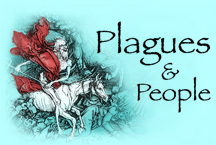| ...The free progress of science is always sure to advance the interests
of humanity. Society but wounds itself when it seeks to discredit
the teachings of science, by setting against the comprehensive and well-weighed
decisions of her true representatives, the crude opinions and hobbyistic
dogmas of men whose perceptions are dimmed by the gloom of the den in which
they think and move....
We have [an] example in the conduct of the Committee on the Public Health
and Nuisances Removal Bills, now before Parliament ... [which] have encountered
formidable opposition from a host of "vested interests" in the production
of pestilent vapors, miasms, and loathsome abominations of every kind.
These unsavory persons, trembling for the conservation of their right to
fatten upon the injury of their neighbours, came in a crowd, reeking with
putrid grease, redolent of stinking bones, fresh from seething heaps of
stercoraceous
[feces-filled] deposits to lay their "case" before
the Committee.
They were eloquent upon the health-bestowing properties wafted in the
air that had been enriched in its playful transit over depots of rotten
bones, stinking fat, steaming dungheaps, and other accumulations of animal
matter, decomposing into wealth, such as the imagination shrinks from picturing,
and which language cannot describe.
The Committee had before it a soap-boiler..., Mr. Archibald Kintrea
(why should his name not live?).... He denies that soap-boiling produces
disagreeable effluvia; he "rather likes it himself;" nay, more, "he means
to say, that people generally enjoy it" -- ladies especially. And as
to its being prejudicial to health, he only knows, that whilst he and his
children lived upon the premises, they reveled in exuberant health, and
have fallen off since they left. The fact is, it is all a matter
of association or of fashion. The odour of putrefying fat is not
only salubrious, but agreeable, if you can only make up your mind to discard
vulgar prejudices....
But Mr. Kintrea and his colleagues do not rely upon these facts alone.
They have "scientific" evidence! They bring before the Committee
a doctor [John Snow] and a barrister.... Now, the theory of Dr. Snow
tallies wonderfully with the views of the "Offensive Trades' Association" -- we
beg pardon if that is not the right appellation.... And they could
not possibly get a witness more to their purpose.
Dr. Snow tells the Committee that the effluvia from bone-boiling are
not in any way prejudicial to the health of the inhabitants of the district;
that "ordinary decomposing matter will not produce disease in the 'human
subject.'"
He is asked by Mr. Adderley, "Have you never known the blood poisoned
by inhaling putrid matter?"
"No; but by dissection-wounds the blood may be poisoned."
"Never by inhaling putrid gases?"
"No; gases produced by decomposition, when very concentrated,
will produce sudden death; but when the person is not killed, if he recovers,
he has no fever or illness."
Dr. Snow next admits that gases from the decay of animal matter may produce
vomiting but says this would not be injurious unless frequently repeated.
Is this scientific evidence? Is it consistent with itself?
It is in accordance with the experience of men who have studied the question
without being blinded by theories?
Let it first be observed that Dr. Snow admits that the gases from decomposing
matter may kill outright -- a pretty convincing proof of their potency.
He also admits that in a less concentrated form they may cause vomiting.
And here he stops, assuring us, that if they don't kill us, or cause repeated
vomiting, they do us no harm....
Why is it ... that Dr. Snow is singular in his opinion? Has he
any fact to show in proof? No! But he has a theory, to the
effect that animal matters are only injurious when swallowed! The
lungs are proof against animal poisons; but the alimentary canal affords
a ready inlet. Dr. Snow is satisfied that every case of cholera for
instance, depends upon a previous case of cholera, and is caused by swallowing
the excrementitious matter voided by cholera patients.
Very good! But if we admit this, how does it follow that the gases
from decomposing animal matter are innocuous? We cannot tell.
But Dr. Snow claims to have discovered that the law of propagation of cholera
is the drinking of sewage water.
His theory, of course, displaces all other theories. Other theories
attribute great efficacy in the spread of cholera to bad drainage and atmospheric
impurities. Therefore, says Dr. Snow, gases from animal and vegetable
decompositions are innocuous! If this logic does not satisfy reason,
it satisfies a theory; and we all know that theory is often more despotic
than reason....
Now we do not think it necessary to prove, by adducing evidence in opposition
to Dr. Snow, that decomposing animal and vegetable matters are injurious
to health. They ought not to be suffered to be stored in inhabited
localities. We are not acquainted with a single medical practitioner
of established reputation who would not consider that the removal of deposits
of decomposing animal and vegetable matters was an essential condition
for the improvement of the health of towns. We have adverted to the
evidence of Dr. Snow, for the purpose of repudiating it as the expression
of the teaching of medical science.... |

